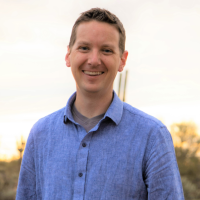Jeff attended Arizona State University, majoring in Secondary Education for Social Studies, later adding a Master’s degree in Secondary Education from Northern Arizona University in 2007. While at ASU, he returned to his alma mater, Mountain View High School in Mesa, to be a student teacher and learn from someone he considered the best, his AP US Government teacher from high school. After that, he was hired to teach at Mountain View and taught various Social Studies subjects over 17 years, including US Government, AP European History, AP Comparative Government, and Economics.
Liz has over two decades of experience in civic education and has taught most of the social sciences in the Gilbert and Chandler districts, including; 8th grade, AP Government and Politics, and dabbled in APUSH, World History, US History, and College Prep Government and Politics. She has a Bachelor of Science in Elementary Education, Early Childhood Development, and a Master’s in Secondary Education, History from Northern Arizona University. Liz is a National Board Certified Teacher {2009} in Social Studies/History (Early Adolescence). Lastly, she has completed her certification for Project Management and works a lot in grant work.
A Few Fun Facts about your Civic Education Program Directors
Favorite historical document
Jeff: I love reading the Anti-Federalist Papers. The Federalist Papers are wonderful sources, but the Anti-Federalist Papers provide a rich context to understand the arguments about the Constitution in real-time. In some cases, they express some prescient fears about potential downsides of the system of government in the Constitution that we have had to account for throughout history. Reading both the Federalist and Anti-Federalist Papers can help us become more thoughtful and patriotic citizens. I also love the essays of Frederick Douglass, especially around the time before and after the Emancipation Proclamation was issued. He is so incredibly deliberate in his thought process about how to respond to the arguments made at the time.
Liz: The Declaration of Independence is my favorite historical document. Even though it is not a governing document, it lays out an extensive argument for separation from Britain. I feel it’s also an accessible document for students. It also allows us to look at our country from a lens of compromise. This brings in two critical questions from one of the Design Challenges in the EAD Roadmap:
- How do we simultaneously teach the value and the danger of compromise for free, diverse, and self-governing people?
- How do we help students make sense of the paradox that Americans continuously disagree about the ideal shape of self-government but also agree to preserve shared institutions?
Favorite thing to teach
Liz: I loved teaching the Supreme Court! I was able to attend a life-changing professional development experience with Street Law in 2016. During this time, I learned so much and was able to be in Court for decisions. The ability to bring that back to my students created a complete learning experience. I could talk about the Supreme Court all day.
Jeff: This is very hard to decide, but as an AP European History teacher, I always really enjoyed our study of the Reformation period. The writings and primary source images from the time are so fascinating and show such an incredible diversity of perspectives, thanks to the emergence of the printing press just prior. Much of Martin Luther’s writing is quite sarcastic and funny and makes for some enjoyable class readings. As all the various actors make various Biblical references and allusions in these sources, it becomes a little bit like a puzzle to decode what is said to the students. My Sunday School lessons from years growing up in church came in really handy to help explain all of these references.
The historical figure you’d want to have dinner with
Jeff: Lech Wałęsa was the leader of Poland’s Solidarity movement and President of Poland from 1990-1995. I am fascinated by the campaigns to resist communism and Soviet influence that built up across eastern Europe during the Cold War, ultimately ending communist regimes across the continent through non-violent resistance. I would love to talk to him about his struggles throughout that period, both inside and outside his country, and what it was like to build a democracy in the aftermath.
Liz: William Howard Taft. I find his presidency and later his Supreme Court career interesting. He never wanted to be President and seemed happiest when sitting on the Court as Chief Justice. The ability to sit on two branches of the federal government is interesting, but having a career post-presidency is even more fascinating.
Favorite thing about working at the Center for American Civics
Liz: My favorite thing about working at the Center for American Civics the ability to work with Arizona’s best: teachers! We have such an incredible job and the ability to provide resources, workshops, and opportunities for educators around Arizona. We believe teachers are the experts and love partnering with them to create elevated experiences in Arizona. I’ve also enjoyed making our podcast! Check it out!
Jeff: My favorite moments at the Center for American Civics have been my chances to interact with teachers from across the state as we host them for professional development workshops. I love hearing feedback about how they bring their creativity and passion to our state and country’s need to rebuild a solid civic education system. They have been an absolute joy to work with. They bring so many different experiences and backgrounds with them, and they have helped me feel rewarded for my work by expressing their gratitude for the workshops and EAD materials. They are indeed one of the best resources our state has!

